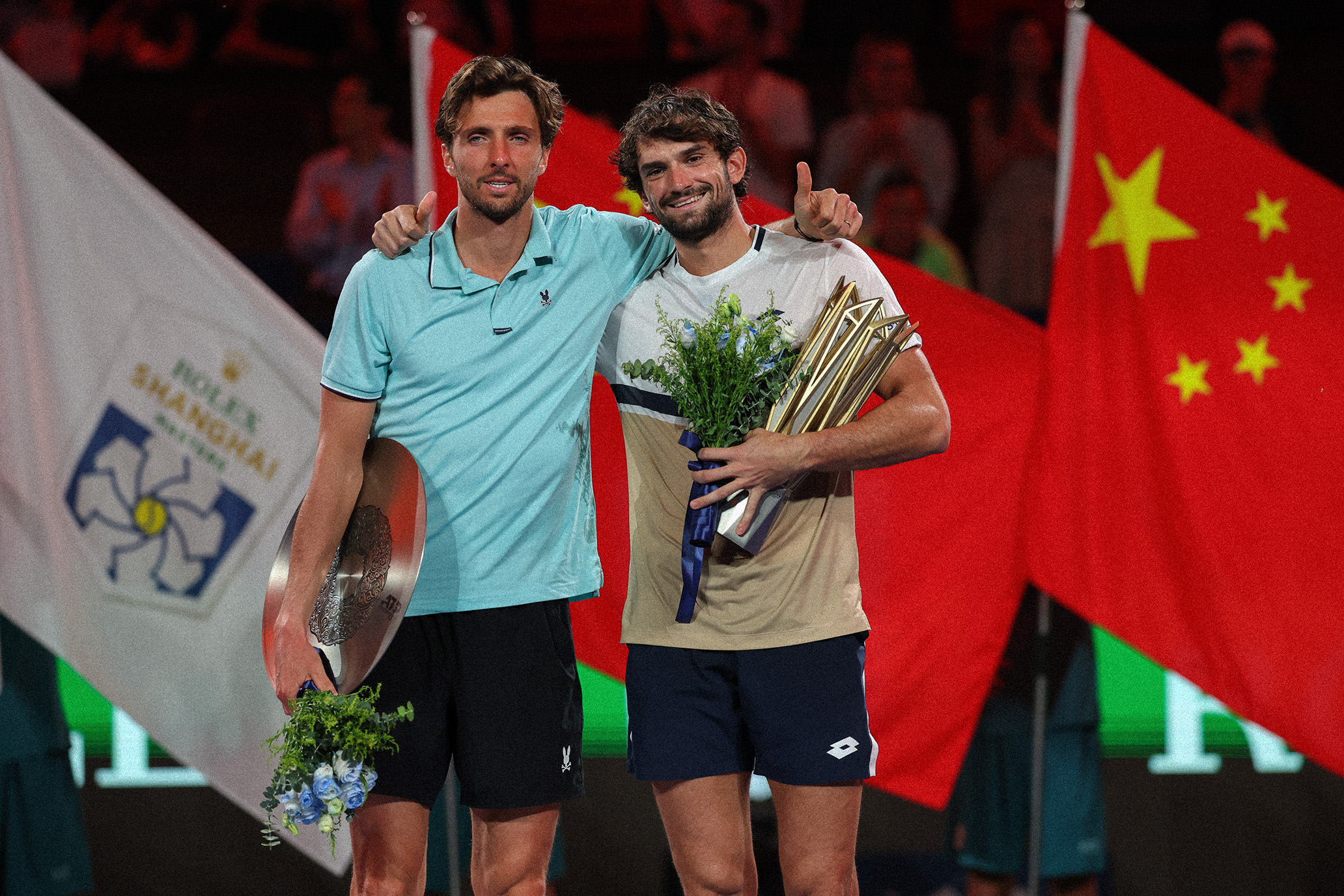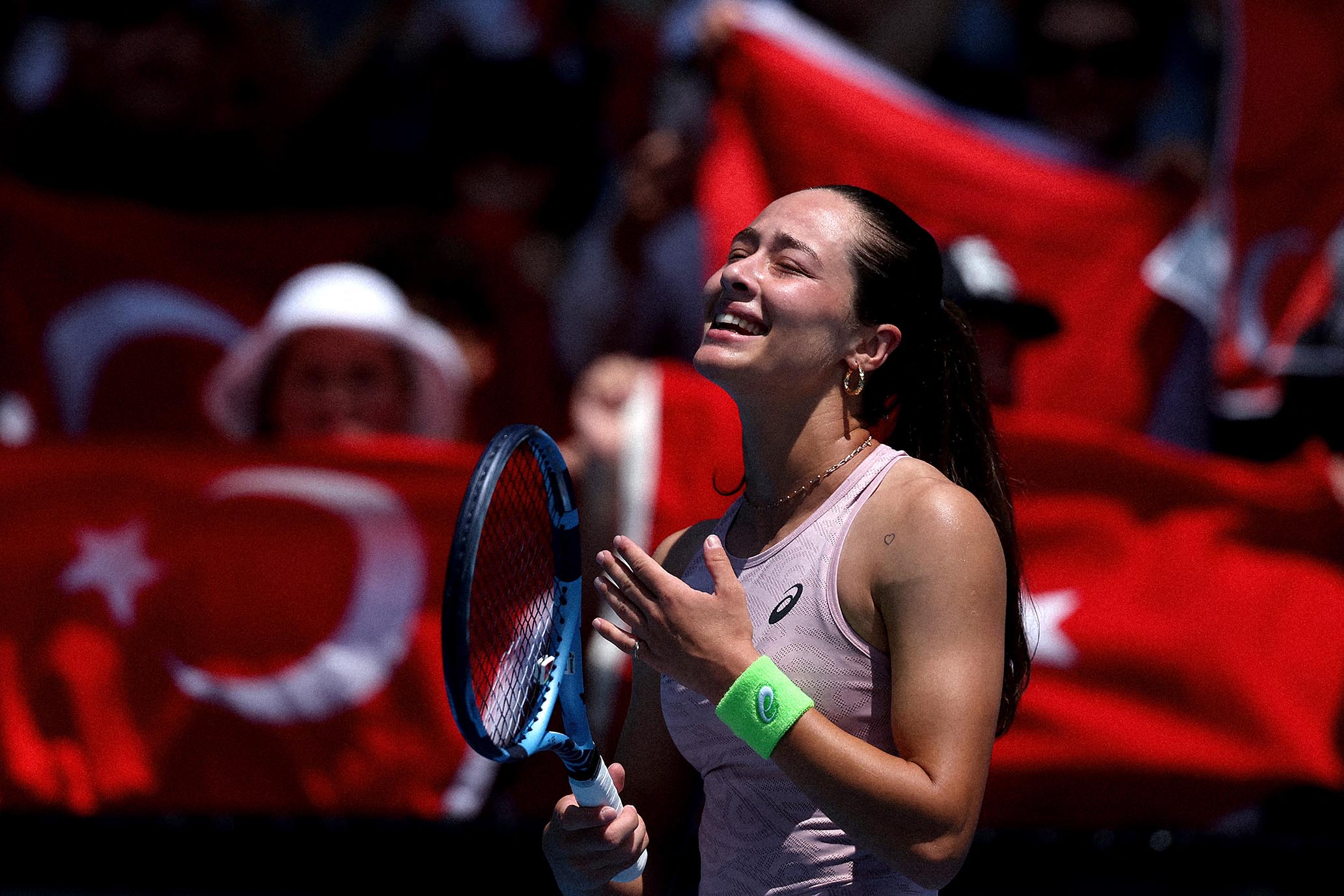Family Affair
Family Affair
A career altering run in Shanghai for cousins Valentin Vacherot and Arthur Rinderknech.
A career altering run in Shanghai for cousins Valentin Vacherot and Arthur Rinderknech.
By Giri NathanOctober 13, 2025

Don't ever take sides against the family: Cousins Rinderknech (left) and Vacheron in Shanghai. // Getty

Don't ever take sides against the family: Cousins Rinderknech (left) and Vacheron in Shanghai. // Getty
Describe the conclusion of the Shanghai Masters, one of the most surreal happenings in modern tennis history, and it all sounds fabricated. Each successive detail makes it sound more and more like tennis Mad Libs. There are two finalists. One of them was ranked outside the top 50 and had never made it past the third round of a Masters event like this. The other one was ranked outside the top 200, had barely even made it into the qualifying draw in Shanghai, and had won only one previous match at a Masters tournament. Collectively they defeated Daniil Medvedev, Sascha Zverev, Felix Auger-Aliassime, Holger Rune, and Novak Djokovic en route to the final. Also, they’re cousins.
A double Cinderella run within the same family tree, in the same week of the tennis season. Preposterous stuff. The players in question, 30-year-old Arthur Rinderknech and 26-year-old Valentin Vacherot, said that their family group chats were blowing up during the tournament. Makes sense, since tennis is a family affair. Their mothers are siblings, and Rinderknech’s mother, Virginie Paquet, was a professional player too. The two men have been playing tennis together their entire lives. Vacherot followed Rinderknech to Texas A&M, where the cousins were college teammates and occasional doubles partners. Currently Vacherot is coached by his brother, Benjamin Balleret. And after the match, which Vacherot won, 4–6, 6–3, 6–3, he wrote on the camera, “Grandpa and grandma would be proud.”
Before this life-changing run, Vacherot’s name would have only been known to those who study the Challenger tour. In the spring of 2024, he was on the cusp of breaking into the top 100, but a shoulder injury took him out for the season, and he’d been slowly working his way back up. To measure the oddness of this result, just look at his most recent loss before Shanghai: At the Saint-Tropez Challenger, he lost to the world No. 311. That is not typically the mark of a player who is about to beat three top-20 players and lift a Masters title. But he snuck into the qualifying draw after several players ahead of him withdrew. And then he played the tournament of a lifetime. Shanghai was notorious for brutally hot and humid conditions, which caused a flurry of retirements. Vacherot had a bigger workload, playing those two extra matches of qualifying, and he still beat everyone in his path. In six of his matches, he bounced back after losing the first set. How did he know this was coming? Six weeks before the tournament, he’d sent a message to a friend: “I’m gonna go take my chance in Shanghai Q’s because a sick run can come any second.”
The other cousin, Rinderknech is a much more familiar name to tennis fans, having spent the past few seasons at the tour level and having gone 6–3 against top-20 opponents this year. (The most high-profile of those wins was his upset of Zverev at Wimbledon.) Having watched a lot of his tennis this year, I often felt like his ranking didn’t reflect his ceiling. As Medvedev put it before their semifinal matchup: “He’s the type of player that when his game is on he can beat anyone. His serve is amazing, he hits the ball great. So he’s not the type of player where, as I say, when his game is on you know that you’re still going to have some chances, rallies. He’s going to try to finish the point in two shots.” Rinderknech won that match in straight sets, and Vacherot came down from his courtside seat to hug him, now that they had secured their dream final. Rinderknech looked ahead with joy: “Tomorrow night there will be two winners anyway. There’s going to be a match, of course, but today we won everything. We couldn’t win any more, you know. We won everything.”
In the final, the two players did genuinely look like tennis cousins. At 6 foot 5 and 6 foot 4, respectively, Rinderknech and Vacherot are lean and rangy, both with imposing serves, both capable of athletic plays at the net. Despite their inexperience playing a match with these stakes—or anything remotely close—the quality of the match was extremely high. This was charismatic all-court tennis, and the ambiance was exactly as positive as you might expect between two players who found themselves in these strange, happy circumstances. For any fan who needed a palate cleanser in this era of unbroken Sincaraz dominance, it’d be hard to ask for a better match, or storyline, than this one.
Vacherot became the lowest-ranked player to ever win a Masters title in the 35-year history of the format. He became the first player from Monaco to win an ATP title. He won $1,124,380 in prize money from Shanghai; before this tournament began, he’d won $594,077 in his entire professional career. He leaped up from No. 204 in the world to No. 40. Meanwhile, with this runner-up finish, Rinderknech will move up from No. 54 to No. 28 in the world. I recommend watching the words that Rinderknech offered his cousin, in their native French. “Two cousins are stronger than one,” he said, as both of them cried. A few minutes later, in an apt final tribute to the conditions in Shanghai, Rinderknech began cramping and tumbled off the platform, while his cousin chuckled—a little comic relief from all the intense emotions of those career-altering two weeks.

PURE, ORIGINAL TENNIS — SIGN UP!
RECOMMENDED
The 2026 Australian Open Shoe Report
SHOE REPORTS
Zeynep Sonmez Brings the Ruckus
AUSTRALIAN OPEN
Mixed Doubles
OPEN TENNIS — VOLUME 2



